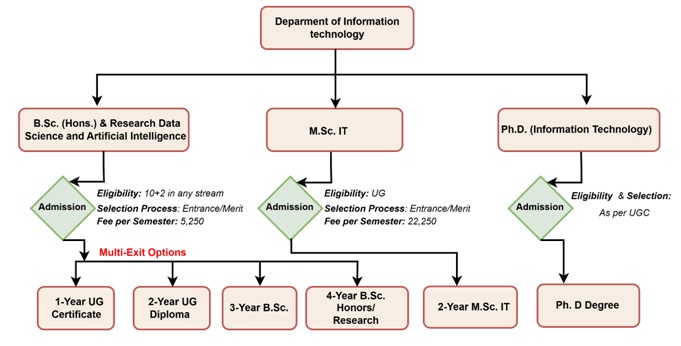
Department of Information Technology
The Department of Information Technology is one of three departments under the School of Mathematical & Computer Sciences.
The department is presently offering various programs under NEP-2020 which include Under Graduate (B.Sc. in Data Science and Artificial Intelligence),
Post Graduate (M.Sc. IT) and Research Program (Ph.D.)
Objectives:
The primary objective of the Department of Information Technology is to provide high-quality education, research, and innovation in the domains of
Data Science, Artificial Intelligence, and Information Technology. The department aims to achieve the following goals through its diverse programs:
B.Sc. in Data Science and Artificial Intelligence:
- Foundational Understanding: Provide students with a strong base in mathematics, statistics, computer science, and core areas such as machine learning, data mining, and algorithm design.
- Technical Skills: Build proficiency in programming languages like Python, and SQL, and enable familiarity with AI and data science tools such as TensorFlow, PyTorch, Keras, and scikit-learn.
- Understanding of Computer Systems: Develop a thorough understanding of computer systems, including hardware, operating systems, networks, and architecture.
- Data Handling: Equip students with skills in data acquisition, cleaning, transformation, visualization, and storage using industry-standard platforms.
- Machine Learning and AI Techniques: Introduce and apply a wide array of machine learning models and AI techniques to solve real-world challenges across domains like healthcare, finance, and security.
- Practical Experience: Offer hands-on learning through industry-driven projects, internships, hackathons, and collaborative research to bridge theory and practice.
M.Sc. in IT:
- Advanced IT Knowledge: Deliver in-depth theoretical and practical knowledge in advanced areas of information technology such as cloud computing, cybersecurity, IoT, and big data analytics.
- Research and Innovation: Foster critical thinking and innovation through coursework and mini-projects that align with emerging trends and technologies.
- Professional Development: Prepare students for leadership roles in the IT industry with strong analytical, managerial, and communication skills.
- Industry Collaboration: Encourage real-world problem solving through collaborations with industry experts, tech startups, and research labs.
Research Program (Ph.D.):
- Cutting-Edge Research: Promote interdisciplinary research in areas such as artificial intelligence, machine learning, cybersecurity, data science, human-computer interaction, and computational intelligence.
- Innovation and Impact: Encourage innovation with the goal of addressing societal and industrial challenges through impactful research contributions.
- Scholarly Excellence: Support research scholars through regular seminars, paper publications, funded projects, and participation in national/international conferences.